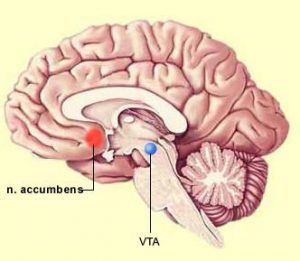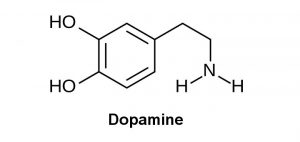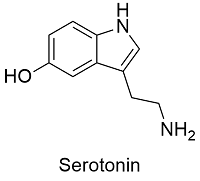Have you ever rejected someone who was madly in love with you? Have you ever been rejected by someone you really loved?
Neuroscientist, Helen Fisher, asked these two questions 20 years ago, both to which 95% of men and women said yes. Determined to understand this magic, she began a multipart project in 1996 to investigate the neurochemistry involved in romantic love.
She studied couples who had just fallen madly in love with each other, individuals who were dumped by their partners that day (talk about a rough day, huh), and couples who have been married for 20+ years. The fMRI scans revealed that people in love show brain activity in the same regions, the nucleus accumbens and the ventral tegmental area (VTA), as those addicted to hard drugs such as opioids and cocaine. Both of these areas are associated with dopamine production and distribution. Dopamine is a neurotransmitter (chemical messenger) associated with the brain’s reward system, primarily involved in addiction, cravings, energy, and motivation.

Brain areas associated with dopamine. Source: Wikimedia

Dopamine. Source: self
Essentially, this means that lovers and drug addicts show similar behaviour. I think that perhaps romantic love is an even stronger addiction in a sense that everyone experiences it at some point but the same can’t be said for other addictions such as substance abuse or gambling. Those in love show the same fundamental symptoms of addiction: craving, tolerance, emotional dependence and when they get dumped they experience withdrawal and relapse.
Another neurotransmitter involved, according to Fisher, is serotonin which regulates mood, anxiety, and depression. Interestingly, she found that new lovers and long-term lovers had the same basic reward systems, with one exception. The fMRI scans showed that new couple had more activity in brain regions linked with anxiety; whereas long term couples showed activity is regions associated with calmness and pain suppression.

Serotonin. Source: self
With 20 years of research on the brain in love, Helen Fisher is a household name in Neuroscience. She nicely summarises her major findings over the years in this TedTalk. Dating platforms such as Match. com, Tinder, and others use her research on what attracts people to each other in their algorithms.
I think love as a positive addiction is certainly an interesting perspective. I believe that the scope of this can go far beyond just algorithms. Perhaps this means that building strong and healthy relationships can help people recovering from addictive behaviours such as substance dependence, binge eating disorders, gambling, etc. by acting as a reward replacement. Additionally, with rising divorce rates cross-culturally, understanding the mechanisms involved in love and how we form relationships, can help us become more empathetic and build long-term relationships as a society.

3 responses to “Your Brain in Love”